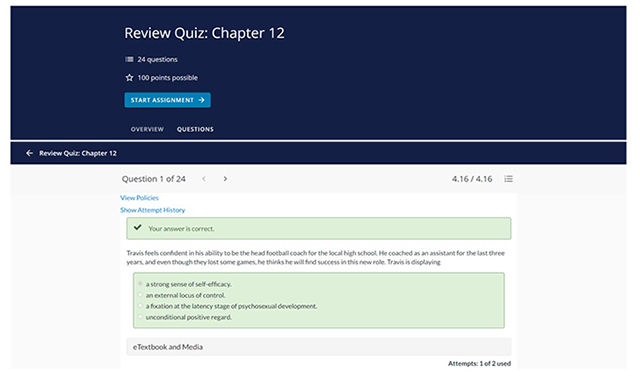
Real World Psychology, 3rd Edition
By Catherine A. Sanderson and Karen Huffman
Real World Psychology offers students a wealth of tools and content in a structured learning environment.
Backed by learning science and customer-driven development, the WileyPLUS course supports instructors with efficiency and data-driven insights so they can help students succeed in their coursework and beyond. Adaptive Assignments pinpoint learner knowledge gaps and offer personalized support, targeted content, video instruction, and answer explanations.
The course contains a wide array of media content—including author videos, topical videos, activities and demonstrations, interactivities, and animations.
The 3rd Edition focuses on Scientific Thinking and Practical Applications, underscoring that connecting psychological science to everyday life is critical to student engagement and key to student success—in the course, in students’ future careers, and in their everyday lives.
Schedule a Demo Request Instructor AccountWant to learn more about WileyPLUS? Click Here
Adaptive Assignments
Adaptive Assignments ignite students’ confidence to succeed in the course. By continuously adapting to each student’s needs and providing achievable goals with just-in-time instruction, Adaptive Assignments close knowledge gaps to accelerate learning.
Chapter Introduction Videos
Author Catherine Sanderson introduces students to the topic they are about to study in a casual, conversational way to pique curiosity and give practical, everyday context.
Topical Videos
In each of these vibrant new video presentations, the authors go in depth on a key topic. Each video has a corresponding video quiz question set for instructors to use when creating assignments.
Chapter Section Videos
These substantial presentations of each chapter section’s content provide students with a variety of video and animation resources to further understanding of the topic.
Animations
These engaging animations illustrate difficult-to-learn concepts from a real-world perspective and are included within the module where the topic is being discussed.

Review Quiz
These pre-created applied quizzes allow instructors to quickly assign a short set of multiple-choice questions that test students’ ability to apply the material they have just learned.
Key Features
- Science-Focused Theme and Framework: This new theme underscores that scientific thinking, combined with the ability to apply psychological science principles to our everyday lives, is key to students’ success—not only in the introductory psychology course, but in their everyday lives, their majors, and even, their future careers. New research, new examples, and content focused on scientific reasoning and on application are now framed in features that reflect the theme: Scientific Thinking Highlights, Practical Application Highlights, and Research Challenges. Word icons in the text highlight where these features appear.
- Focus on Gender & Cultural Diversity: A new feature in the 3rd edition, Gender and Cultural Diversity spotlights the importance of considering gender and cultural perspectives in applying psychological science. Word icons identify this new feature where it appears.
- New Edition Updates: The 3rd edition includes a fresh design and layout, over 1,200 new research citations, new photos, figures, and tables, and several chapter reorganizations—all designed to improve students’ experience and keep them engaged with the content.
- Discovery Questions: Questions to pique students’ curiosity about the science behind everyday experience now appear with each chapter section, repeating the appeal to students’ inquisitiveness. Word icons in the text reveal where the science is explained.
- APA Focus: In accordance with the APA’s goals for the undergraduate psychology major, careful attention has been given to key textual content and features, the Test Bank, and other learning materials in WileyPLUS to ensure they meet the APA’s goals and guidelines. Content throughout is correlated to the APA guidelines, allowing instructors to easily find what they are looking for.

Karen Huffman is Professor Emerita of Psychology at Palomar College, San Marcos, California, where she taught full-time until 2010 and served as the psychology student advisor and co-coordinator for psychology faculty. She has received the National Teaching Award for Excellence in Community/Junior College Teaching, given by Division Two of the American Psychological Association (APA), and has received many other awards and accolades.
Karen Huffman is the author of several textbooks, including Psychology in Action, Real World Psychology, and the first edition of Psychological Science. Huffman’s research and presentation focus is on active learning and critical thinking. She has given presentations and been an invited or keynote speaker at numerous conferences and has conducted online and in-person seminars and teaching workshops throughout the United States and Puerto Rico, Canada, and Europe.
.

Catherine A. Sanderson is the Poler Family Professor of Psychology at Amherst College. She received a bachelor’s degree in psychology, with a specialization in health and development, from Stanford University, and received master’s and doctoral degrees in psychology from Princeton University.
Her research has received grant funding from the National Science Foundation and the National Institute of Health. Professor Sanderson has published over 25 journal articles and four college textbooks, including Psychology in Action, Real World Psychology, and the first edition of Psychological Science, which she co-authors with Karen Huffman. She has also published two trade books, The Positive Shift and Why We Act: Turning Bystanders Into Moral Rebels.
Professor Sanderson regularly speaks for public and corporate audiences on topics like the science of happiness, the power of emotional intelligence, the art of aging well, and the psychology of courage and inaction. These talks have been featured in numerous mainstream media outlets, including The Washington Post, The Boston Globe, USA Today, The Atlantic, CNN, and CBS Sunday Morning with Jane Pauley. She also writes a weekly blog for Psychology Today—“Norms Matter”—that examines the power of social influence on virtually all aspects of our lives. Catherine’s work on integrating DEI into the Introduction to Psychology course has been presented at national conferences and featured in the APA’s IPI Course Design Institute.
In 2012, she was named one of the country’s top 300 professors by The Princeton Review.
- Introduction and Research Methods
- Neuroscience and Biological Foundations
- Stress and Health Psychology
- Sensation and Perception
- States of Consciousness
- Learning
- Memory
- Thinking, Language, and Intelligence
- Life Span Development
- Gender and Human Sexuality
- Motivation and Emotion
- Personality
- Psychological Disorders
- Therapy
- Social Psychology

